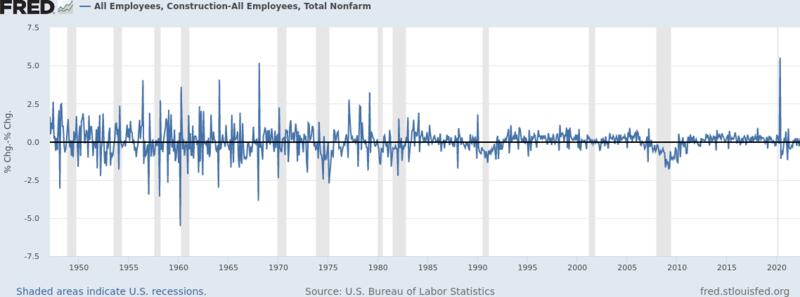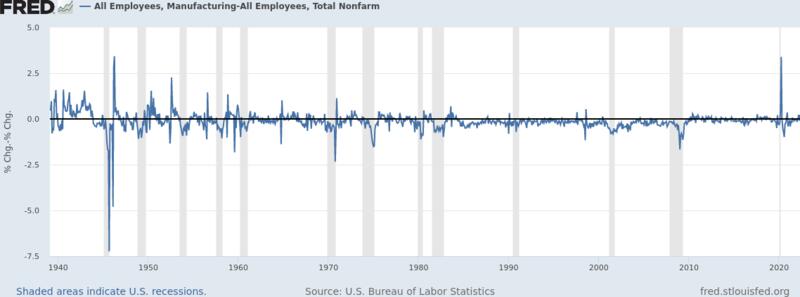In today’s CNBC article titled “The 4 most ‘recession-proof’ industries to work in, according to economists” we read that “certain industries tend to fare worse than others during a downturn”. Wow, well, that’s promising, right? A list of jobs or businesses to avoid, and others to pursue. (For the United States, presumably.) Fantastic premise! But then…
But then the article continues:
During the Great Recession, which lasted from 2007 to 2009, the construction and manufacturing sectors experienced sizable dips in employment, according to data from the Bureau of Labor Statistics.
It makes sense that manufacturing is affected. We’re talking about the Great Recession, and in a recession demand drops, and thus employment in manufacturing is likely to drop.
But housing? Again, we’re talking about the Great Recession of 2008—which was triggered (if not caused) by a housing bubble.
Before, many people had gotten loans that shouldn’t have (because they couldn’t afford them) and all that basically fake demand created a massive construction boom. When that went south of course housing construction fell into a black pit and construction jobs with them. As Investopedia notes:
Over the last decade, the global economic downturn that began in December 2007 has influenced the current real estate environment more than any other.
But does that mean during every recession construction jobs are terrible? And worse than in the overall economy?
Do recessions affect construction jobs worse than the average?
To see if that pans out I used the St Louis Fed’s data to compare changes to construction jobs to overall non-farm jobs. If the line goes above zero, it means that the construction sector created jobs faster than the rest of the (non-farm) economy. If it goes below zero, construction did worse. The gray areas are times of recession—officially, according to NBER.

Sources:
- Link to the graph: https://fred.stlouisfed.org/graph/?g=Rtmn
- U.S. Bureau of Labor Statistics, All Employees, Construction [USCONS], retrieved from FRED, Federal Reserve Bank of St. Louis; https://fred.stlouisfed.org/series/USCONS, July 6, 2022.
- U.S. Bureau of Labor Statistics, All Employees, Total Nonfarm [PAYEMS], retrieved from FRED, Federal Reserve Bank of St. Louis; https://fred.stlouisfed.org/series/PAYEMS, July 6, 2022.
Looks a bit like a mixed bag, doesn’t it? Anyway, let’s go through those recessions and see how construction jobs are doing compared to the non-farm economy:
- 1948, 1953, 1969: ups and downs
- 1957, 1960: slightly worse
- 1973, 1980, 1981: mostly worse
- 1990: clearly worse, following a trend before and after
- 2001: same as the average
A few thoughts:
- it seems the trend has gotten worse: in the post-war period recessions were not affecting construction jobs worse than the overall economy on average. in the 70s/80s/90s recessions construction did worse for sure.
- 2001 was mostly a tech bubble bursting (“dot com”), so it makes sense that construction is less affected
- 2020 shows that first lots of people were scared of expenses—and then many who could afford moved into bigger houses (creating demand)
What about manufacturing?
But what about manufacturing? Was that so-so, too? Nope, just look at this:

Sources:
- Link to the graph: https://fred.stlouisfed.org/graph/?g=RtiN
- U.S. Bureau of Labor Statistics, All Employees, Manufacturing [MANEMP], retrieved from FRED, Federal Reserve Bank of St. Louis; https://fred.stlouisfed.org/series/MANEMP, July 6, 2022.
- U.S. Bureau of Labor Statistics, All Employees, Total Nonfarm [PAYEMS], retrieved from FRED, Federal Reserve Bank of St. Louis; https://fred.stlouisfed.org/series/PAYEMS, July 6, 2022.
Ugh! No mixed bag here—manufacturing jobs do badly during every recession.
So, what do we conclude from these (very tiny) bits of data?
Takeaways
- construction seem to have done fairly alright in the 50s/60s compared to the rest of the non-farm jobs on average, and gotten worse later.
- 2008 is not a great example, it’s an outlier—because it was a housing bubble that burst
- manufacturing is a totally different ballgame: those jobs are doing worse than the rest of non-farm jobs during recessions—and do so consistently
So… what jobs do well during a recession? Have a look at the full article. No spoilers! ;)
